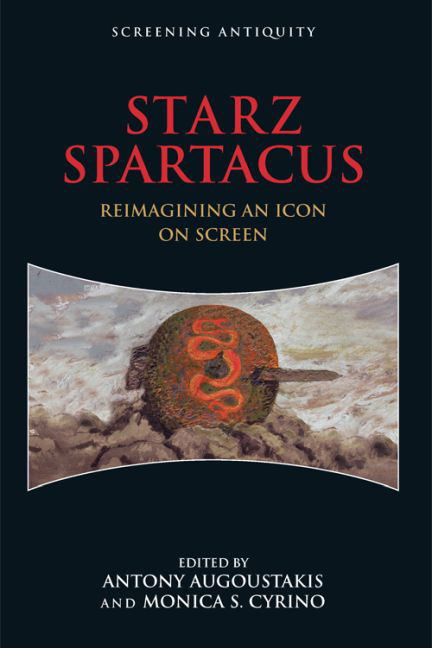Book contents
- Frontmatter
- Contents
- Series Editors' Preface
- Editors' Acknowledgments
- Contributors
- List of Illustrations
- Episode Listing
- Introduction: Reimagining a New Spartacus
- PART I HEROES AND HEROISM
- PART II SOCIAL SPACES
- PART III GENDER AND SEXUALITY
- PART IV SPECTACLE AND VIOLENCE
- 11 Base Pleasures, Spectacle, and Society
- 12 Draba's Legacy and the Spectacle of Sacrifice
- 13 Violence and Voyeurism in the Arena
- Filmography
- Bibliography
- Index
12 - Draba's Legacy and the Spectacle of Sacrifice
from PART IV - SPECTACLE AND VIOLENCE
Published online by Cambridge University Press: 27 April 2017
- Frontmatter
- Contents
- Series Editors' Preface
- Editors' Acknowledgments
- Contributors
- List of Illustrations
- Episode Listing
- Introduction: Reimagining a New Spartacus
- PART I HEROES AND HEROISM
- PART II SOCIAL SPACES
- PART III GENDER AND SEXUALITY
- PART IV SPECTACLE AND VIOLENCE
- 11 Base Pleasures, Spectacle, and Society
- 12 Draba's Legacy and the Spectacle of Sacrifice
- 13 Violence and Voyeurism in the Arena
- Filmography
- Bibliography
- Index
Summary
The character Draba from the 1960 film Spartacus, the black gladiator who spares Spartacus and sacrifices himself, is minor, yet of major importance, as he inspires the slave rebellion. Read against the social and political context of the film's release, namely the burgeoning Civil Rights movement, Draba and his actions have been viewed as a commentary on contemporary race relations in America. Although the STARZ Spartacus series omits Draba, his impact emerges in several key scenes from the first season, Blood and Sand. The twenty- first-century version replaces his blackness with ethnicity and displaces it onto other characters in positions of greater power. This erasure or shifting of race is not only appropriate for more progressive times and reflective of the un-racialized nature of Roman slavery, it also highlights the series’ subordination of race and focus on the dichotomy of master and slave. Retention and reconfiguration of other elements of the scene, such as issues of choice and sacrifice, condemn the Romans and reveal the slaves’ moral superiority and potential for agency and for inverting the spectacle. The dehumanizing spectacle of slaves fighting for the Romans’ entertainment has been transformed as slave-gladiators fight and kill each other to advance the Romans’ aspirations or fulfill their personal motivations and vendettas.
In this chapter, I explore how the STARZ series reworks this pivotal scene from the 1960 film, the private fight of Spartacus and Draba before Crassus and Draba's refusal to kill Spartacus. I examine two scenes from Blood and Sand, both private fights between Spartacus and a brother gladiator for the entertainment of the elite: Spartacus’ fight against Varro, an exhibition turned deadly (episode 110), and Spartacus’ fight against Crixus, a match to the death transformed into rebellion (episode 113). These scenes emphasize Batiatus’ aspi- rations for social mobility and political advancement and Lucretia's and Ilithyia's desires for vengeance against former sexual partners, reveal that these Romans are baser in their scheming and desires, and lead to revolt. I then consider a variation on this scene, Naevia's fight against Crassus’ son Tiberius in the last season, War of the Damned (episode 309). As the rebels honor the fallen with a spectacle of blood, the series presents a black woman, transformed from meek house-slave to fierce warrior and fury personified, about to avenge her lover's death.
- Type
- Chapter
- Information
- STARZ SpartacusReimagining an Icon on Screen, pp. 192 - 210Publisher: Edinburgh University PressPrint publication year: 2017



